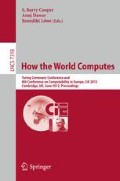Abstract
In algorithmic randomness, when one wants to define a randomness notion with respect to some non-computable measure λ, a choice needs to be made. One approach is to allow randomness tests to access the measure λ as an oracle (which we call the “classical approach”). The other approach is the opposite one, where the randomness tests are completely effective and do not have access to the information contained in λ (we call this approach “Hippocratic”). While the Hippocratic approach is in general much more restrictive, there are cases where the two coincide. The first author showed in 2010 that in the particular case where the notion of randomness considered is Martin-Löf randomness and the measure λ is a Bernoulli measure, classical randomness and Hippocratic randomness coincide. In this paper, we prove that this result no longer holds for other notions of randomness, namely computable randomness and stochasticity.
Access this chapter
Tax calculation will be finalised at checkout
Purchases are for personal use only
Preview
Unable to display preview. Download preview PDF.
References
Bienvenu, L., Doty, D., Stephan, F.: Constructive dimension and Turing degrees. Theory of Computing Systems 45(4), 740–755 (2009)
Bienvenu, L., Gács, P., Hoyrup, M., Rojas, C., Shen, A.: Algorithmic tests and randomness with respect to a class of measures. Proceedings of the Steklov Institute of Mathematics 271, 41–102 (2011)
Downey, R.G., Hirschfeldt, D.: Algorithmic Randomness and Complexity. Springer (2010)
Kjos-Hanssen, B.: The probability distribution as a computational resource for randomness testing. J. Log. Anal. 2 (2010)
Nies, A.: Computability and Randomness. Oxford University Press (2009)
Merkle, W., Miller, J.S., Nies, A., Reimann, J., Stephan, F.: Kolmogorov-Loveland randomness and stochasticity. Ann. Pure Appl. Logic 138, 183–210 (2006)
Muchnik, A.A., Semenov, A.L., Uspensky, V.A.: Mathematical metaphysics of randomness. Theoret. Comput. Sci. 207, 263–317 (1998)
Shen, A.: One more definition of random sequence with respect to computable measure. In: First World Congress of the Bernoulli Society on Math. Statistics and Probability Theory, Tashkent (1986)
Wang, Y.: Resource bounded randomness and computational complexity. Theoretical Computer Science 237, 33–55 (2000)
Author information
Authors and Affiliations
Editor information
Editors and Affiliations
Rights and permissions
Copyright information
© 2012 Springer-Verlag Berlin Heidelberg
About this paper
Cite this paper
Kjos-Hanssen, B., Taveneaux, A., Thapen, N. (2012). How Much Randomness Is Needed for Statistics?. In: Cooper, S.B., Dawar, A., Löwe, B. (eds) How the World Computes. CiE 2012. Lecture Notes in Computer Science, vol 7318. Springer, Berlin, Heidelberg. https://doi.org/10.1007/978-3-642-30870-3_40
Download citation
DOI: https://doi.org/10.1007/978-3-642-30870-3_40
Publisher Name: Springer, Berlin, Heidelberg
Print ISBN: 978-3-642-30869-7
Online ISBN: 978-3-642-30870-3
eBook Packages: Computer ScienceComputer Science (R0)

